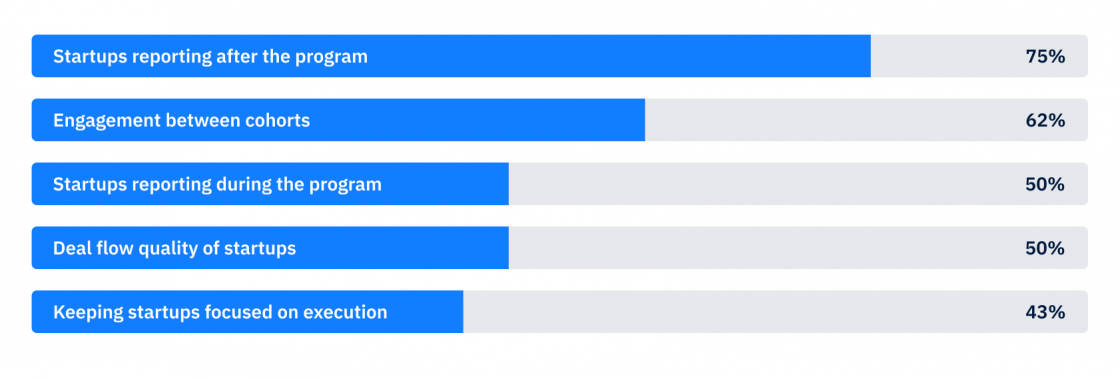Universities that have embraced entrepreneurship and innovation as part of their curriculum are a good starting point for the entrepreneurial journey of the youth. Their first role when running an accelerator program is to convince students of the viability of entrepreneurship as a career path. But that should not stop there. University accelerators should be viewed as the safest place in which future entrepreneurs can practice real-world skills. They are the only places where it is alright to fail, as consequences are minimal.
A university accelerator is a controlled sandbox where future startups can train for their future success and challenges. A lot of successful startup stories don’t come from first-time founders. Which is why being able to build their first startup early on, will give students a well-needed experience in this field.

Findings and insights
- Most university accelerators struggle with startup reporting after the program. Our study shows that about 75% of university accelerators come up against this challenge. A reason for this could be the lack of a good reporting system to compile, analyze, and share data. Clarity is absent. In consequence, the participants fail to see the real value of university accelerator data, which could potentially help them transform a summer project into a first time successful startup.
- Startups reporting during the program is almost as challenging as reporting after the program. Unified and constant data is crucial to the success of an accelerator. Without this data, it can be hard for them to be taken seriously by students and future entrepreneurs, as well as by investors.
- One might argue that part of the challenges that university accelerators have with deal flow quality could be due to a lack of focus. 2 out of 3 accelerators have a generic target and draw a large variety of startups. But quantity is never equal to quality. One way of attracting the right kind of startups could be having a narrow focus, vertically or horizontally, or both. Our study shows that 50% of university accelerators have a problem finding quality leads, while only 27% say they have a problem with quantity (mostly due to increasing competition in the market).
- There is an unfortunate idea among students that university accelerators are an opportunity to learn rather than anything else. While being a great exercise for the future, university accelerators could be the launchpad for some truly successful startups. If only students would remain loyal to them and put in the work.
“Getting students to commit to an accelerator when they have other opportunities available to them during the summer”
— Jerry Ciolino, Startup UCLA
- The majority of university accelerators offer perks. 80% offer office space as well as legal & accounting support. These are golden for a startup. Legal and accounting are two pressure points where costly mistakes are often made. If we combine these perks with the early-stage access to hard data, networking, access to labs, coaching, technical services, and other resources, we conclude that university accelerators are an important pillar sustaining the growth of entrepreneurs.
- The alumni and mentor’s networks are two reasons for which university accelerators should be viewed as serious opportunities for future entrepreneurs. More than 60% of university accelerators introduce startups to their potential clients.
Thoughts
- If universities could show students the potential of their accelerator programs through hard data, perhaps students would treat these programs with a higher level of dedication. Which will, in turn, attract better applications and ultimately better investors.
- University accelerators could choose to narrow their focus based on their assets: mentors, alumni, and their ability to attract a certain talent.
- Having a sandbox to practice and to make all possible mistakes with little consequence is a unique opportunity for students. And the data that results from this sandbox could give investors a better idea about where the startup world is headed in the future.
Until recently, young entrepreneurs had to choose between getting an education and starting their business. Now, as a student, you have a higher chance of launching a successful startup inside a university accelerator. Thankfully, entrepreneurship has become a study subject in itself and university accelerators offer students the opportunity to practice what they are taught. In fact, university accelerators can be thought of as sandboxes for future startups.